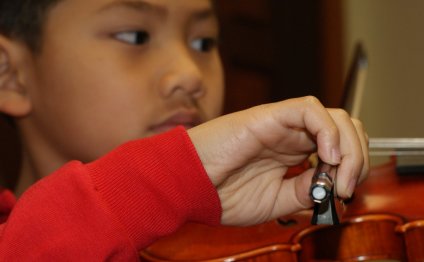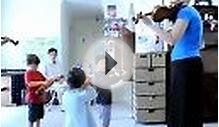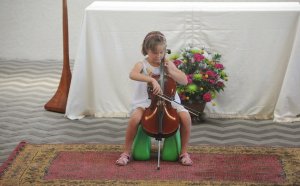
Suzuki Violin lessons
More than fifty years ago, Japanese violinist Shinichi Suzuki realized the implications of the fact that children the world over learn to speak their native language with ease. He began to apply the basic principles of language acquisition to the learning of music, and called his method the mother-tongue approach. The ideas of parent responsibility, loving encouragement, constant repetition, etc., are some of the special features of the Suzuki approach.
Parent Involvement
As when a child learns to talk, parents are involved in the musical learning of their child. They attend lessons with the child and serve as “home teachers” during the week. One parent often learns to play before the child, so that s/he understands what the child is expected to do. Parents work with the teacher to create an enjoyable learning environment.
Early Beginning
The early years are crucial for developing mental processes and muscle coordination. Listening to music should begin at birth; formal training may begin at age three or four, but it is never too late to begin.
Listening
Children learn words after hearing them spoken hundreds of times by others. Listening to music every day is important, especially listening to pieces in the Suzuki repertoire so the child knows them immediately.
Repetition
Constant repetition is essential in learning to play an instrument. Children do not learn a word or piece of music and then discard it. They add it to their vocabulary or repertoire, gradually using it in new and more sophisticated ways.
Encouragement
As with language, the child’s effort to learn an instrument should be met with sincere praise and encouragement. Each child learns at his/her own rate, building on small steps so that each one can be mastered. Children are also encouraged to support each other’s efforts, fostering an attitude of generosity and cooperation.
Learning with Other Children
In addition to private lessons, children participate in regular group lessons and performance at which they learn from and are motivated by each other.
Graded Repertoire
Children do not practice exercises to learn to talk, but use language for its natural purpose of communication and self-expression. Pieces in the Suzuki repertoire are designed to present technical problems to be learned in the context of the music rather than through dry technical exercises.
Delayed Reading
Children learn to read after their ability to talk has been well established. in the same way, children should develop basic technical competence on their instruments before being taught to read music.
Introductory Course
The SAA has an introductory course designed for prospective Suzuki parents and teachers.
Are Suzuki Kids Prodigies?
Are Suzuki students musical geniuses? Are they ‘gifted’ children who have a special talent for music? Are their parents professional musicians?
Fortunately, Suzuki students are normal children whose parents may have little or no musical experience. Their parents have simply chosen to introduce them to music through the Suzuki approach, a unique philosophy of music education developed by Shinichi Suzuki.
The Suzuki Legacy
Shinichi Suzuki was a violinist, educator, philosopher and humanitarian. Born in 1898, he studied violin in Japan for some years before going to Germany in the 1920s for further study. After the end of World War II, Dr. Suzuki devoted his life to the development of the method he calls Talent Education.
YOU MIGHT ALSO LIKE



Share this Post
Related posts
Violin lessons in San Diego
Mikhail is on the leading edge of Multi-Instrumental Instruction. With the help of modern technology for recording and teaching…
Read MoreBlues Guitar Lessons Beginners
Welcome to the sixth video of the Blues Guitar Quick-Start Series. In this lesson, we’re going to shift our focus from rhythm…
Read More










